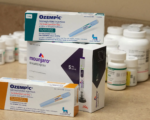Novo Nordisk Shares Dip Amid Earnings Miss and Reduced Profit Outlook

Novo Nordisk experienced a dip in its share price after posting weaker-than-expected net profit for the second quarter and revising its operating profit outlook downwards. The pharmaceutical giant reported a net profit of 20.05 billion Danish kroner ($2.93 billion) for the quarter ending in June, falling short of the 20.9 billion Danish kroner projected by LSEG analysts. Additionally, the company’s EBIT (earnings before interest and tax) was 25.93 billion Danish kroner, below the forecasted 26.86 billion Danish kroner.
In response to these results, Novo Nordisk adjusted its full-year 2024 operating profit growth expectations to a range of 20% to 28%, down from the previous 22% to 30%. This announcement caused the company’s shares to tumble nearly 7% before recovering slightly, trading down 2.71% by 9:40 a.m. London time.

Despite the disappointing second-quarter earnings, Novo Nordisk raised its sales growth guidance for the full year, expecting growth between 22% and 28% at constant exchange rates, up from the previous estimate of 19% to 27%. This optimism is partly driven by a 55% increase in sales of its popular weight loss drug, Wegovy, which reached 11.66 billion kroner in the second quarter compared to the same period in 2023.
CEO Lars Fruergaard Jørgensen expressed confidence in the company’s future growth, highlighting the potential for “attractive growth” in the coming months. He assured investors of the company’s ability to scale operations and supply patients, emphasizing that adjustments to rebates were a factor in the second-quarter results. Jørgensen remains positive about the long-term competitiveness of Novo Nordisk, even in the face of increasing competition from companies like Roche, which recently reported promising early-stage trial data for its obesity drug candidate.
Moreover, Novo Nordisk’s Wegovy has recently achieved significant milestones. The drug was approved for sale in China, the world’s second-largest economy, and received backing from medical regulators in the U.K. and European Union for reducing risks of serious heart events among overweight and obese adults.



















